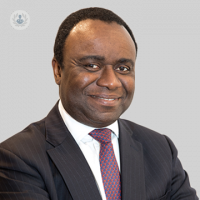Slipped disc treatment: everything you need to know
Written by:Slipped discs, also known as herniated discs, can cause a range of different symptoms, ranging from pain and pins and needles to loss of bladder or bowel control. In his latest informative article, revered adult and paediatric spinal deformity surgeon Mr Colin Nnadi explains this condition in detail.

What is a slipped disc?
The spinal column is made up of vertebrae (bones) stacked up on top of each other. These vertebrae are separated by discs which are like spacers or shock absorbers. The discs are made of a thick outer wall called the annulus and a gel-like central portion called the nucleus pulpous. In young people the discs are mobile and flexible, but with age become stiffer and start to wear out.
A slipped disc occurs when the gel-like substance in the middle of the disc slips through a defect in the outer wall. This is called herniation of the disc. A herniated disc can cause pressure on the nerves which supply the legs. This pressure is transmitted as pain often referred to as 'Sciatica'.
How do slipped discs most commonly occur? How common is this problem?
In most cases, there is no obvious cause but can be associated with ageing, exercise, lifting heavy objects the wrong way, or being inactive. People often describe pain coming on during normal activities of daily living such as lifting things, twisting or turning etc. It can be a source of pain in 1-5% of people. It is more common in younger people in their 20s and 30s and affects men more than women.

What are the signs and symptoms of a slipped disc? When should you see a doctor?
It can present as back, buttock or leg pain or both. The pain often radiates below the knee and can involve the foot. It is associated with feelings of numbness or pins and needles. Patients can sometimes complain of weakness in the leg as well. Most of the time, symptoms will resolve within a few weeks. If the pain lasts longer and is starting to interfere with your quality of life then you should see your doctor. You must see a doctor if the numbness and weakness are getting worse and spreading or if you feel your bladder or bowels are not working properly.
Is treatment always required?
80-90% of cases will settle within 6-12 weeks and no further treatment other than simple over-the-counter painkillers are required. It is important to keep as active as possible.

What are the available treatment options for a slipped disc?
Treatment options are non-surgical or surgical.
Non-surgical treatments include physiotherapy or manual therapies like osteopathy, keeping active and taking painkillers such as paracetamol or ibuprofen. The painkillers should be taken regularly rather than just when the pain is bad. Cortisone injections are another useful way of avoiding surgery. The effect of these injections may not always be long-lasting and may need to be repeated.
Surgical treatments involve making a small incision in the middle of your back and stripping muscles off the spine. A window is created in the bony spine and the slipped disc is identified by moving the nerve out of the way. The slipped disc is then shaved off. This relieves the pressure on the nerve and should abolish the pain.
The surgery can be done through the traditional open method or newer minimally invasive techniques. You should discuss these with your surgeon.
Mr Colin Nnadi is a highly-experienced adult and paediatric spinal deformity surgeon with more than 30 years of experience. If you would like to book a consultation with Mr Nnadi you can do so today via his Top Doctors profile.


